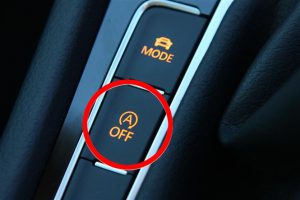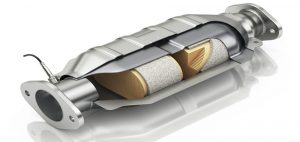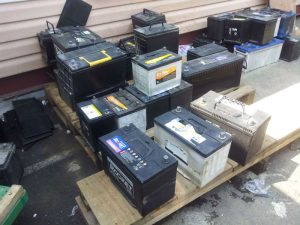Guest Post by Eric Peters

ASS may save gas – but it’s not so good for the environment.
There is a warning to be found in some new car owner’s manuals – which will probably be redacted once the problem is discovered. Or rather, made public.
It reads –
To minimize the possibility of catalytic converter damage: Do not shut off the engine or interrupt the ignition when the transmission is in gear and the vehicle is in motion.
ASS – automated engine stop/start – ought to read the owner’s manual.
It repeatedly shuts off the engine and on-purpose at every red light and will also shut it off if the car stops moving for some other reason – such as to place an order at a drive-thru window or because traffic momentarily congealed.
It does so to “save gas” – though not much. At least, not much on a per-car basis. An ASS-equipped car might use 1 percent less gas than an otherwise identical car without ASS.
It’s not a big selling point.
But ASS is being installed in most new cars not because buyers are clamoring for the less-than-1-percent improvement in mileage that attends repeatedly stopping and restarting the engine but because it helps the car companies meet federal MPG minimums, which are calculated on the basis of “fleet averages.” That additional 1percent per car matters – to the manufacturer – when factored over tens of thousands of cars.
Which is why almost all 2020 model year cars come with ASS, like it or not.
The driver – for whom the owner’s manual was written – has no control over this. Especially lately, in ASS-equipped cars that haven’t got an ASS-off button which the driver can use to keep the engine from shutting off at every red light, drive-thru window and momentary pause in the flow of traffic.
Not that it makes any difference to the catalytic converter – the most critical emissions control device in a car – whether the engine is shut off repeatedly by the driver or by ASS.
Either way, its ability to convert harmful emissions – the actually harmful ones, not carbon dioxide – may be compromised – and its life reduced – by the constant off-on cycling that comes with ASS. Which almost all new cars (and trucks and SUVs) come with as part of their standard – and so unavoidable – equipment package. 
The problem – soon to be redacted – with repeatedly cutting off the engine with the transmission in gear is the possibility of not-quite-complete combustion; of excessive gasoline vapors getting into the exhaust stream because of combustion interruptus – and fouling the converter.
Cats also like consistently hot temperatures to convert combustion byproducts into harmless compounds. But when the exhaust isn’t flowing because the engine isn’t running, the temperature varies – and what effect will all that erratic operation have on catalytic converter performance and longevity? Will a new car’s converter – some new cars have several converters – be working up to snuff 12 or 15 years from now?
Where’s the EPA?
Shouldn’t it be of concern to the Environmental Protection Agency that ASS might affect a car’s emissions by affecting the performance – and longevity – of its catalytic converters?
Apparently not.
For the same reason that the National Highway Traffic Safety Administration isn’t much concerned about the effect on safety of drivers tapping and swiping built-in touchscreens, only the ones they carry with them in their pockets.
ASS isn’t good for the environment in other ways, too.
The 12 volt battery which starts the engine is filled with environmentally unpleasant materials – about 50 pounds’ worth. When batteries can’t hold a charge anymore, they get chucked – sometimes in the woods.
Sometimes in dumpsters.
People are supposed to turn them in for recycling, of course – but that doesn’t always happen. And even if it does, if it’s necessary to replace a car’s battery a year sooner – because of ASS – then it means more batteries out in circulation as well as more batteries that will end up in the woods and dumpsters and so on.
More batteries will be needed – and thrown away – because ASS is hard on 12 volt starter batteries. The one in your 2020 model year car is not fundamentally different from the 12 volt starter batteries used 50 years ago.
They are among the very few things about new cars that aren’t new.
But they were designed to start the engine on the assumption that it wouldn’t be turned off for awhile. The idea was to get it running – not repeatedly get it running.
It takes energy – charge – to spin the starter and get the engine running. This depletes the battery’s charge, but just a little. Once the engine is running, the battery is recharged – by the alternator, which is what produces electricity to run the engine once it’s actually running as well as to “top off” the starter battery.
!2 volt batteries were made just large enough – and just strong enough – to handle that.
Not ASS
Subjecting12 volt starter batteries to ASS – stop-start/stop-start/stop-start – will mean replacing them more often. And that will mean more lead and acid in dumpsters and the woods, as well as more plastic for battery cases – the plastic being made using petroleum and by machinery not solar-powered.
But the good news is your ASS-equipped car might use a bit less gas. You might even notice a whole number’s difference.
It is my sincere desire to provide readers of this site with the best unbiased information available, and a forum where it can be discussed openly, as our Founders intended. But it is not easy nor inexpensive to do so, especially when those who wish to prevent us from making the truth known, attack us without mercy on all fronts on a daily basis. So each time you visit the site, I would ask that you consider the value that you receive and have received from The Burning Platform and the community of which you are a vital part. I can't do it all alone, and I need your help and support to keep it alive. Please consider contributing an amount commensurate to the value that you receive from this site and community, or even by becoming a sustaining supporter through periodic contributions. [Burning Platform LLC - PO Box 1520 Kulpsville, PA 19443] or Paypal
-----------------------------------------------------
To donate via Stripe, click here.
-----------------------------------------------------
Use promo code ILMF2, and save up to 66% on all MyPillow purchases. (The Burning Platform benefits when you use this promo code.)






This is what everyone gets for letting government and environmentelists design cars. Wait until they start telling everyone what they can and can not do, have, say, think, eat, buy, sell and where you can live. This crap will never end until folks say enough or push back hard.
Maybe by then we can all immigrate to China.
I dunno how much palladium is in converters, but at +/- 2300 per ounce, I hope it isn’t much cuz that would sure be an anchor on the warranty repair . . . oh, wait, the guesstimate was ten or more years, so it won’t be car companies that have to worry about it. And funny that he mentioned the wear on the battery but NOT the wear on the solenoid/voltage regulator/alternator (which has fan-blades on the drive-pulley for a reason) and starter motor, all of which will need to be replaced more often. Not to mention that when an engine gets hot, the viscosity of the oil drops and lightweight oils like 5w-30 (pretty common in modern engines) turn to water and QUICKLY drain from the top of the engine back to the pan. So, when it cranks itself back up, there’s not enough oil to protect the moving parts from friction . . . over and over and over. So the engine itself actually sees more wear, too.
First time I rode in a vehicle so equipped, when the engine shut off at a stop light, I looked at the driver and at the tachometer – dead needle – and asked, “What happened?” He looked at me like nothing happened – because , to him, nothing had; he was used to it. When he explained I just shook my head and said, “Wow, that’s built-in obsolescence on a grand scale.” He didn’t understand what I meant, so I explained to him the above paragraph. He didn’t say much for awhile, and then I dropped the bomb: “And just wait til it fries itself, and you can’t start the engine at all.”
Will probably happen the day after the warranty expires.
Now you understand why politicians/management and manufacturers support these insane “improvements “. The purpose is to force consumers to buy more cars because they wear out sooner!!! Spend more fiat$$ on overpriced junk the overworked goyim cannot afford!! Until finally people give up and use ride sharing services cuz cars are out of reach financially…
And to force us into EV’s — especially after they outlaw production of ICE’s (this is already occurring in Europe).
It doesn’t look like there’s going to be a lot of cars made in 2020 – or 2021. I don’t watch much TV. Are there still vehicle ads? I’m guessing not.
There are some third party solutions.
In fact, third-party solutions that aim to bypass engine auto-stop-start often take advantage of the open hood workaround What these systems do is wire a timer relay to the hood sensor. When the vehicle is not running or in accessory mode, the relay causes the ECU to “see” an open hood regardless of what the sensor actually reads. Once the car starts, the relay closes, correctly indicating the hood’s status as closed. This prevents the engine auto-stop-start system from operating while guaranteeing that the pesky open hood indicator light disappears with the rest of the warnings that flicker to life upon starting a vehicle with an open hood.
The article fails to mention the deleterious effect that “ASS” will have on the drivetrain — constant accelerations from stop in engines that have had their oil and transmission fluid pressure stopped has got to greatly decrease engine and transmission longevity. HINT: on average they’ll last just a little bit longer than the warranty period. Yet another price we’ll pay for the “sustainability” mantra of the “climate change” fraud.